| In this dog-eat-dog society where severe competition for employment is prevailing, undergraduate students are eager to participate in a number of out of school activities. These activities used to be one of the requirements for students to have in order to get hired at one of the top conglomerates; however, nowadays, the students strive to grasp the golden chance of being accepted as a participant of those extra-curricular activities simply because they are difficult to do, often coming through a competition of 600 to one just to take part in them. |

What is a 'Spec'? It is an abbreviation for the term ‘specification.’ Spec means Co-Curricular Records (CCR) and refers to evaluation factors for employment such as one’s educational background, GPA, official English test scores, and more. It is said that educational background, GPA, a TOEIC score, licenses, experiences in studying overseas, volunteering, doing internships and winning awards are the eight main Specs in Korea.
It is such a problematic issue that university students take a stab at participating in numerous activities outside of school thoughtlessly. This is because a lot of them believe these are prerequisite for employment and consider them even more essential than studying. Some examples of these activities include internship programs, Supporters Program, and certain contests. Students tend to not sort through which Spec activities will be truly fruitful for them; they merely do them for the sake of increasing the number of activities they have achieved. However, reckless attempts are neither helpful for them to be employed in the future nor time-efficient. In fact, it may not even help them enhance their career.
Therefore, in this article we are going to discuss whether or not these Spec activities are truly helpful for undergraduates by interviewing UOS students and alumni, and by dealing with some side effects of the activities.
The Current Situation
Numerous university students today are immersed in participating in various outside activities. It almost became an astonishing fact that among university students, it is a trend to apply for a leave of absence in order to do Spec activities. According to the Korea National Statistical Office, the utmost popular reason for undergraduates to take time off from school is because of extra-curricular programs. The percentage of these students marked 42.9 this year. After 2010 (39.7%), it has consistently been over 40 percent.
The Reasons Why Students Endeavor to Participate in Spec Activities
First,students participate in out of school activities in order to improve their capabilities. Some students believe that they can broaden their perspective and background knowledge through out of school activities rather than through just studying at school. Second, career records of Specs can be included on their resumes. Students think if they do more activities outside of school than others, they will have more to be written on their job resumes which can attract future employers. Moreover, some students achieve Specs solely for the accomplishment. The simple fact that it is so tough to get accepted to participate for one of these activities makes undergraduates commit themselves to become part of one, instead of doing it in order to be employed.
Students’ Views Toward Specs
Let us look at the current trend of college students being involved in extra-curricular activities. We interviewed five UOS students, and the common answer was that all of them enjoyed the activities because they had participated in the ones that they were really interested in.
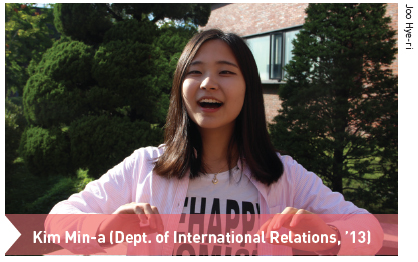
"Through this activity, I realized that South Korea is putting a lot of effort in the energy industry, especially in creating new renewable energy."
She usually looks up for Spec activities online through the MIZY center and the Ministry of Gender Equality and Family websites, but she found out this special program from her close friend. She emphasized that this activity is very beneficial for future participants who have interest in the environmental issues.
Jeong In-gi (Dept. of Open Major, ’13) is a member of Biz Innovator, one of the Central Clubs, of UOS that helps each member to participate in several business administration and marketing activities to enhance their specialized skills in a relevant field.
"I wish to experience as much as I can before I become employed,
so I chose to work actively in this club."
He has not done much so far; however, he expects to do much more various activities as the club will carry out plans such as participating in some contest exhibits starting next year.
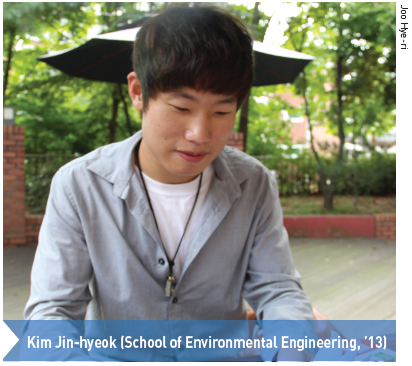
"I am not going to choose an occupation relevant to teaching,
but I truly felt a sense of accomplishment while I was working as a mentor."
An anonymous female student joined UOS Summer SchoolⅡ, which is a buddy program assisting Japanese exchange students during the summer break. While she was looking over the school website notice board, she caught the announcement about the summer school, so she applied for it because she was interested in making foreign friends. During the summer school activity, she stayed at the International House with Japanese students, helping them with Korean assignments and guiding them throughout Seoul.
"I enjoyed this activity and thought it was really memorable.
I am seriously considering getting a job that is related to guiding foreigners."
She is now participating in Buddy Program at the Korean Language Institute of UOS. Hong Su-ji (Dept. of International Relations, ’13) was involved in the 3rd Supporters Program supervised by Korea Trade Fairs., Ltd. There, she took part in actively promoting an exhibition on foreign emigration and studying abroad. There were several parts the supporters could be involved in, such as promoting studying abroad and performing internships in the United States, China, the UK, and the like. Hong also regularly posted information about internships available in America every week on her blog as a part of the supporters activities and conducted an interview with a related organization. Plus, she did some offline promotion on the exhibitions.
"I was able to do better, truthful communication with many people.
I actually gained a lot of firsthand experience since it required abundant
teamwork and hands-on activities rather than reading textbooks."
She finally mentioned that she was not particularly interested in the exhibition industry before, but thanks to this activity that she found out by chance, she became interested in finding out more about related programs.
A commonality of the five students was that all of them believed that Spec activities are crucial when it comes to experiencing fields that they are interested in. In addition, these five students knew participating in out of school activities rashly just to show off is never effective in that it is useless and timeconsuming. Hong highlighted that the point of participating in extra-curricular activities should rather be on showing your passion related to your interests in relevant fields. Kim Jinhyeok asserted that even though Spec activities are important, they should not be a priority over one’s private life and studying. Kim Min-a claimed that outside activities are recommendable, but not essential. Finally, Jeong replied that if students take part in extra-curricular programs in many different fields, they will be able to learn more about unfamiliar spheres beyond school lectures.
Advice from Alumni and Changes in the Selection Criteria in the Job Market
“Do not judge a book by its cover” is a common English expression. The HR (Human Resources) departments in most companies seem to follow this advice nowadays, and their hiring methods are changing. In the past, it was common for employers to dwell on rumors and the prejudice coming from many different apparent conditions of applicants, instead of viewing them with employers’ own eyes to see their real capabilities. Back then, companies only saw applicants’ external conditions such as the area where they were born or which schools they went to, whereas now HR managers evaluate not just the cover of them, but the present aspects of a person as well. This is because it is likely that they miss some advanced capabilities the applicants have when they dwell only on their Specs.
With the current flow of innovative recruiting systems and the changing aspects that a company values from applicants for employment, many HR managers say that they value enthusiasm and the quality of their work ability much more, and the so-called Specs are no longer that important. Is this true or not? The answer is yes and no.
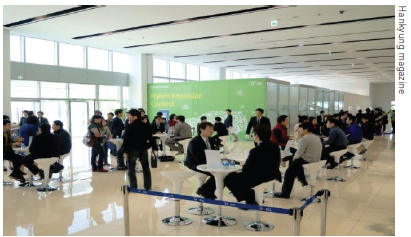
Also, Hyundai Mobis held a presentation on employment called ‘Open House’ and conducted a C.E.O-type Recruiting Contest through this. Candidates who applied for the ‘C.E.Otype Recruiting Contest’ did a five-minute self-presentation to show their insights, enthusiasm and spirit for the job. Unlike general interviews, the candidates were evaluated only by the self-presentation and without any other information being exposed to the interviewers. Candidates who scored high points received an exemption from the resume screening process of recruitment.
Companies prefer prepared individuals. It is a fact that there are many more requirements than before to prepare, since companies want to find people who can become important assets to the company. However, job seekers should caution not to blindly build Specs without seriously thinking about their future careers. Building Specs is important, but corporations really want people who are creative and enterprising. These traits are not obtained by simply getting a lot of Specs.
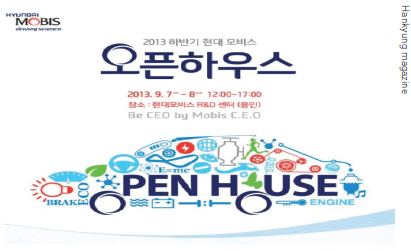
Hong Gyeong-Mi (School of Business Administration, ’04) gave some tips about the recruitment policies of the Financial Supervisory Service, one of the most preferred public agencies to work for by university students. Hong is a
graduate senior working at the Financial Supervisory Service. She paid a visit to the Alumni Mentoring, which was held last semester as a Junior Economist. During the meeting, she said, “We do not require our applicants have any experiences with Supporters Programs, contest exhibitions or internships, since the Financial Supervisory Service only considers how skillful an applicant is in this field.” According to her, they are even liberal when considering the age of the applicants. “Interviews are done without any information about the applicants, so that we can judge the applicants’ actual abilities to do quality work right after they are employed.”
Kyobo Securities Co., Ltd.’s Internship Program Has Been Disclosed
Unfortunately, some of the students' eagerness to acquire Specs is being used as a means of earning profits by some evil companies. We found two examples below. The first one is a corporation using internship participants to increase their sales results, and the second one is a corporation stealing the innovative ideas of students to make a profit at the lowest cost.
Kyobo Securities Co., Ltd. was caught on June 27 by the Financial Supervisory Service for using their interns to increase their sales performance. It was their scheme to force the interns to sell billions of won worth of funds. It included a large number of illegal activities that were involved during the process of inducing the funds from clients. To Kyobo Securities Co., Ltd., the internship program was sort of a business.
The company received a rather light punishment, ‘Institution-caution,’ although it allured the interns to achieve a high sales performance by using employment as a bait and neglected their illegal doings. They also did not have internal control standards in order to prevent the illegal actions by the interns. According to the Financial Supervisory Service, Kyobo Securities Co., Ltd. applied performance-oriented assessment rules to their interns for transition to full-time employment from Mar. 14, 2011 to Apr. 13 of the same year. They reflected sales performance to staff recruiting by the ratio of 50 percent on the first level quantitative evaluation. As a result, 52 interns passed the first period evaluation and only 28 survived to the last. They lured the interns who were desperate to get employed and forced them to get busy drawing funds from even their family and relatives. Per person, they drew at least a billion, at most 60 to 70 billion won.
Some interns compensated 12 million won for clients’ losses that the company made because of the investment sales which is considered a crime. Forcing the interns to compensate for the losses is also a crime according to the Capital Market Act.
Ideas Stolen from Supporters Programs or Contest Exhibits
Since the concept that our society is obsessed with Specs is prevalent, idea competitions are on the upswing. Idea competitions are a good way to have ‘Open Innovation’, in that they are good opportunities to get creative ideas from outside of the company which do not come from in-house staff. It is also beneficial that young people with enthusiasm and insight provide new aspects and bring brilliant ideas to the company.
For undergraduates, idea competitions are viewed as good indirect experiences where they can share and solve problems which might arise in real business scenes beforehand. Preparing for the competitions with friends all night long might also provide remarkably beneficial memories, and in the case that they win awards, this is killing two birds with one stone.
However, many of these idea competitions may be used as schemes to take advantage of the labor of undergraduates at a low cost. First of all, once an 'idea' is submitted to organizers, the intellectual property of the work goes to the sponsor company and commonly it is not returned to the participants. If they get an award it is fortunate, but if they do not, their ideas would be in danger of embezzlement. Second, idea competitions have long been seen as just an inefficient advertising event by the sponsor companies. The success of the competition is judged by the number of applicants and the applied works, not by the quality of ideas. Many times an idea competition is promoted by an external PR (Public Relations) agency or HR (Human Resources) department, and not by the department where the idea is directly needed. In any event, considering how difficult it has become to get a job, the obsession to get lots of Specs probably will not subside anytime soon. Students really need to make careful choices by taking the schemes that corporations use to gain profits from them into consideration.
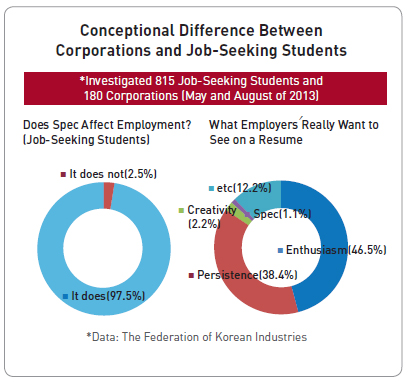
Do it Right
It has been reported that most of the large corporations in Korea emphasize applicants' passion, and they actually consider Specs a non-essential in recruitment. Since last year, the key factors in employment have begun to show a change from Specs.
Following the research by the Federation of Korean Industries (refer to the right graph below), when questioned about what factors they see the most on applicants resumes for recruitment, companies answered, ‘Enthusiasm and an enterprising spirit (46.5 percent)’, while ‘Specs’ counted only for 1.1 percent.
However, undergraduates looking for jobs are still allin for building Specs. Following the Federation of Korean Industries’ research in May (refer to the left graph above), when 815 undergraduates were asked the question “Do Specs affect employment?” 97.5 percent answered “Yes.”
To sum up, instead of naively chasing a bait of Specs, it is rather more important for us to find other various values and develop our unique potential and capabilities. As you can see in the movie Jobs (2013), the society now prefers an applicant with a unique story and abilities, rather than the one with great Specs. Steve Job’s ascension from a college dropout into one of the most revered and creative entrepreneurs of the 20th century shows how a computer nerd who is very talented in computer skills but has no other talents, can still achieve a great success for developing one’s unique capabilities and skills.
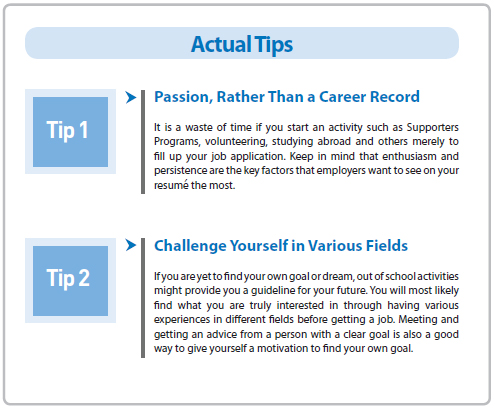
Yoon Hee Junior Reporter
yoonhee1017@uos.ac.kr
Joo Hye-ri Junior Reporter
hr9369@uos.ac.kr

